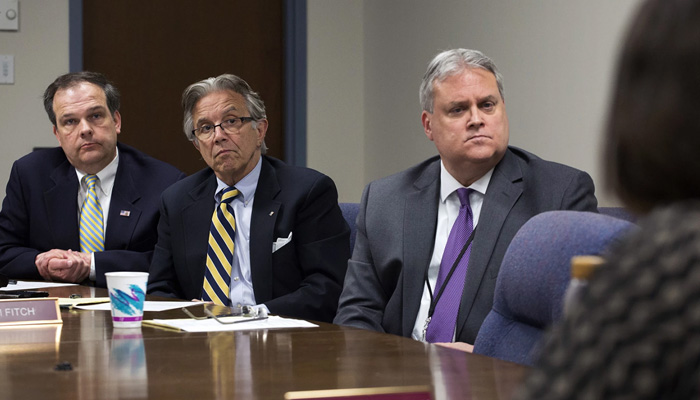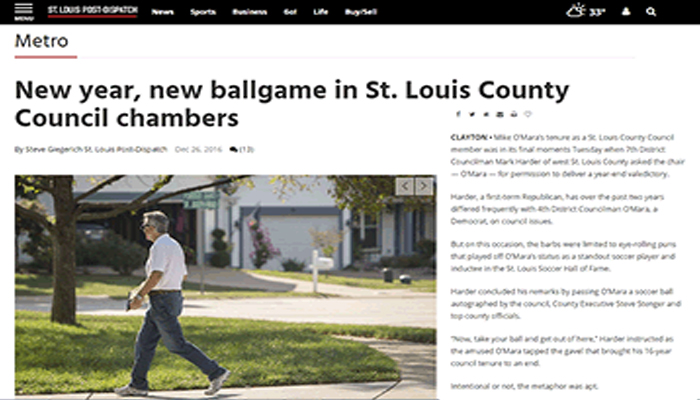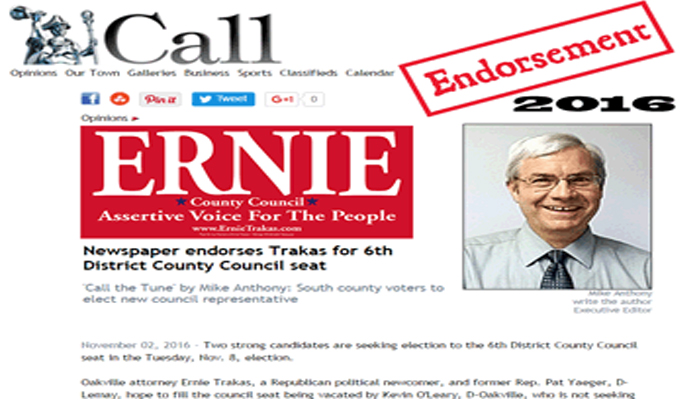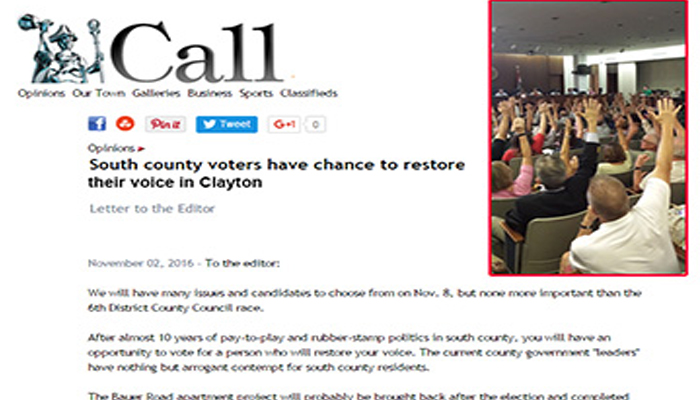Featured Image: Ernie Trakas (center), R-6th District, laughs with Tim Fitch, R-3rd District, during a St. Louis County Council meeting on Tuesday at the St. Louis County Council chambers in Clayton. Trakas was unanimously voted to the position of chair of the St. Louis County Council later in the meeting.
Most Americans have little faith in their government. According to the Pew Research Center, recent polling conducted by Gallup, The New York Times, The Washington Post and others confirm that only 17 percent of Americans trust the government. This distrust extends to state and local government and includes elected officials particularly. Never before have people trusted and respected their elected representatives less. This is neither strange nor unwarranted. We live in one of the most partisan, contentious and dysfunctional times in the history of U.S. politics. Perhaps this is one of the reasons for the current attraction to — and romance with — democratic socialism.
Despite this distrust, representative democracy can and does work. Legislative bodies still act on a bipartisan basis to protect and secure honest, transparent and accountable government. Recent events in St. Louis County demonstrate and confirm this premise.
On April 29, prosecutors unsealed St. Louis County Executive Steve Stenger’s indictment by a federal grand jury on three counts of public corruption. Four days later, senior U.S. District Judge Catherine Perry accepted Stenger’s guilty plea to all three counts.
How Stenger was forced to account for his actions came about is an example of bipartisan, representative government working as intended. More than a year before Stenger was indicted, St. Louis County Council Chairman Sam Page, a Democrat, asked me, a Republican, to chair a bipartisan select Ethics Committee to investigate possible pay-to-play schemes involving the awarding of county contracts and leases to Stenger campaign donors. Over the course of several months, the committee, comprised of two Democrats and two Republicans (the full council is comprised of seven members, four Democrats and three Republicans), interviewed and received testimony from government employees and executives of quasi-governmental development agencies, and obtained and reviewed over 7,000 pages of documents.
Testimony and documents established that the Stenger administration circumvented established protocols and procedures applicable to the negotiation of county contracts and leases, and directed county employees and appointees to agency boards to award county contracts to campaign donors.
After a six-month investigation, including review of contracts, leases, correspondence and electronic communications, and interviews and testimony from government and non-government executives and employees during three public hearings, the committee made numerous findings, including but not limited to the following:
• Customary and established procedures for negotiating and vetting contracts and lease agreements involving Stenger campaign donors were purposefully circumvented. In the process, experienced Department of Public Works employees, typically responsible for negotiating agreements on behalf of the county, were intentionally excluded from all negotiations.
• Stenger instructed his campaign manager to direct, control and handle all negotiations in connection with a certain redevelopment deal, specifically directing him to prevent any involvement by Department of Public Works experts.
• Stenger falsely represented that the redevelopment of a former shopping mall and associated agreements were subject to a competitive bid process, and that an independent financial adviser had confirmed claimed savings.
• Contrary to representations by the Stenger administration, the leases did not result in any savings. They will cost the county $25 million to $30 million.
• Stenger misled the County Council concerning the actual costs of the redevelopment deal.
• Stenger authorized the transfer of funds within the county budget to hide $2.4 million dollars in cost overruns.
• The amount and timing of campaign donations ($360,000) from the developers, and payment of funds to Stenger’s former campaign manager created the appearance of impropriety concerning whether Stenger derived personal benefit from the project.
The committee reported its findings and recommendations to the full council last June, recommending that the matter be referred to the U.S. Attorney for the Eastern District of Missouri. Eleven months later, Stenger was indicted and pleaded guilty to bribery, theft of honest services and mail fraud. He is scheduled to be sentenced on Aug. 9, each of the three counts carrying a potential sentence of 20 years.
In investigating potential public corruption and referring the case to the U.S. Attorney’s office, the members of the St. Louis County Council set aside partisan differences and allegiances in the pursuit of justice for their constituents. They achieved their objective, and in doing so demonstrated that representative democracy still works.













